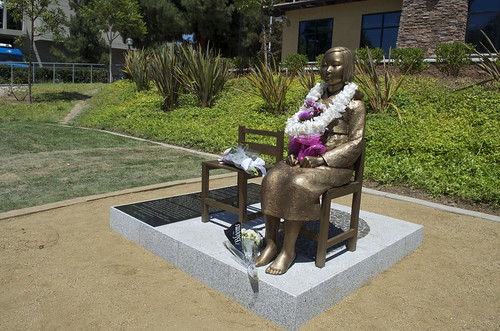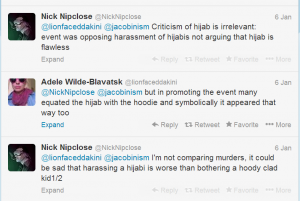The facts
The story of Ryan J. Bell has created quite a bit of buzz these past few days. For those that aren’t familiar, on December 31, Bell -the former senior pastor at the Hollywood Seventh-Day Adventist Church- announced he would be “trying on” atheism for a year. As he said in a blog post announcing this:
So, I’m making it official and embarking on a new journey. I will “try on” atheism for a year. For the next 12 months I will live as if there is no God. I will not pray, read the Bible for inspiration, refer to God as the cause of things or hope that God might intervene and change my own or someone else’s circumstances.
Per Dan Burke at the CNN Religion Blog:
The seeds of Bell’s journey were planted last March, when he was asked to resign as pastor of a Seventh-day Adventist congregation in Hollywood.
He had advocated for the church to allow gay and lesbian leaders, campaigned against California’s same-sex marriage ban and disputed deeply held church doctrines about the End Times.
Eventually, his theological and political liberalism became more than leaders in the denomination could bear, and he lost his career of 19 years. His faith was shaken, and for a while Bell became a “religious nomad.”
By January 3, Bell had been let go from his adjunct teaching positions at Christian at Azusa Pacific University (APU) and Fuller Theological Seminary as well as his consulting agreement with the Glendale City Seventh-day Adventist Church, leaving him with no sources of income.
On January 6, Hemant Mehta of the “Friendly Atheist” blog started an online fundraiser for Bell which has to date raised over $26,000 from an initial goal of $5,000. Mehta had originally been critical of Bell’s year long experiment.
The Narrative
On the blog post announcing the fundraiser, Mehta wrote:
I think it’s important to show that, unlike the Christian organizations, we support someone who’s willing to put his own beliefs under the microscope. Furthermore, we’ll support his experiment even if he doesn’t end up becoming an atheist.
What a disappointing response from the Christian schools and church.
Not unexpected, just disappointing.
One thing’s for sure: Bell just got a dose of reality from his experiment. A lot of atheists remain in the closet precisely because they’re afraid of the ramifications of coming out. They’re afraid of losing their families, friends, or jobs. Bell lost some of those, just for saying he was exploring life without God.
Speaking to Burke, Mehta elaborated:
“He learned what it’s like to be an atheist real fast,” said Hemant Mehta, a prominent atheist blogger and schoolteacher in Illinois.
Mehta said he knows many atheists who fear that “coming out of the closet” will jeopardize their jobs and relationships, just as in Bell’s experience.
…
“I think more than anything else, people appreciate that this guy is giving atheism a shot,” Mehta said. “I mean, he lost three jobs in the span of a week just for saying he was exploring it.”
Why I think this narrative is flawed
Let me start by saying I think Bell’s story has a lot going for it on the “Atheism vs Christianity” front. For one thing, he’s a charismatic former evangelical pastor who has decided to oppose church positions on key progressive issues. For another, he’s willing to potentially leave behind entirely the religious beliefs and practices he’s espoused for most of his adult life. All this in full public view. In addition, it’s hard not to sympathize with the plight of a father with two children who’s life is rapidly changing and has just lost his livelihood-all for seemingly just dabbling in atheism, much less being a outspoken anti-theist.
However, there are two aspects of Mehta’s narrative where I believe he is missing the mark:1) That Bell’s experience of losing his employment has somehow taught him “what it’s like to be an atheist” and 2) That the response from the schools and church that he was working for was somehow unwarranted.
It is true that many atheists keep their convictions to themselves to protect themselves from employment discrimination or harassment, or even just to avoid rocking the boat with their religious co-workers. It is also true that there are employers who would take punitive action against an employee due to a difference in religious convictions or indeed a lack of same. The reason that such retaliation is so insidious however, is that the difference in religious convictions is unrelated to the task at hand. For the vast majority of jobs in secular workplaces, a worker’s atheism is no more a help nor a hindrance then her colleague’s belief in Christianity, Islam, or any other religion.
Some atheists might nonetheless argue that Bell’s non-committal decision to simply give atheism a try ought to be a mitigating factor. To those people, I would request that they ask themselves how they would react if the situation were reversed (while recognizing that such comparisons are rarely precisely equivalent). Would they support with equal enthusiasm an atheist organization that continues to pay for the services of one of their public representatives while that representative goes on their year-long journey of spiritual discovery to blog on a website called for instance “myyearwithjesus.com”? And most importantly, would the cancellation of said employee’s contract be an example of the “jeopardy” Christians face when coming out in the workplace? I would imagine that such an argument would be met with very little sympathy if not outright laughter among even the most tolerant of atheists.
But let’s come even closer to people with Bell’s circumstances and examine members of the clergy who have become atheists with the passage of time and who face many challenges as a result. The Clergy Project is an especially valuable initiative for them. My understanding of what these clergy members typically seek for their next career stop is to transition away from being paid to serve their faith communities. I would be very surprised if many of these clergy members have the reasonable expectation of remaining employed as religious leaders or as seminary teachers after coming out as atheists.
Atheists are right to be outraged when their atheism precludes them from performing secular functions. But how many atheists feel that their opportunities in life are somehow limited by being shut out of teaching positions at Christian seminaries?
This brings me to my second objection. The flip side of atheists not having the reasonable expectation that they ought to have equal opportunities to teach at Bell’s former employers APU and Fuller is that these employers are under no obligation – legal or moral – to entertain Bell’s recent experimentation with atheism. The fact that he’s simply giving it a shot doesn’t change the fact that he is publicly stating his intention to not follow the tenets that they require him to uphold. Regardless of his admirable sincerity and pleasant demeanor, make no mistake that Bell is creating a confrontation, albeit under the guise of “just asking questions”. I have no way of knowing for sure, but I would imagine that the fact that this confrontation comes just a few months after another public falling out with the same church’s leadership also played a role in their decision.
Conclusion
Sympathizing with Bell as a person is quite understandable. He’s in a tough spot for all the reasons outlined above, and these no doubt hit home with many atheists. However, animus against his employers by atheists seems misplaced.
The challenges Bell is facing only bear a superficial similarity to those that atheists face in secular workplaces dominated by Christians in the US. If we are trying to tell powerful stories that exemplify these challenges, my recommendation is that we look elsewhere.
Simon Davis is online marketing director at a health care publications company. His writing has appeared in Free Inquiry and Skeptical Inquirer magazines. You can follow him on twitter at @SimonKnowz
(This is a syndicated post. Read the original at FreeThoughtBlogs.)



